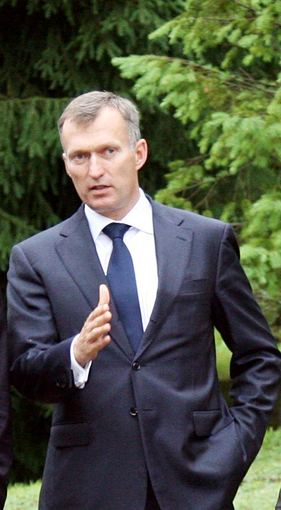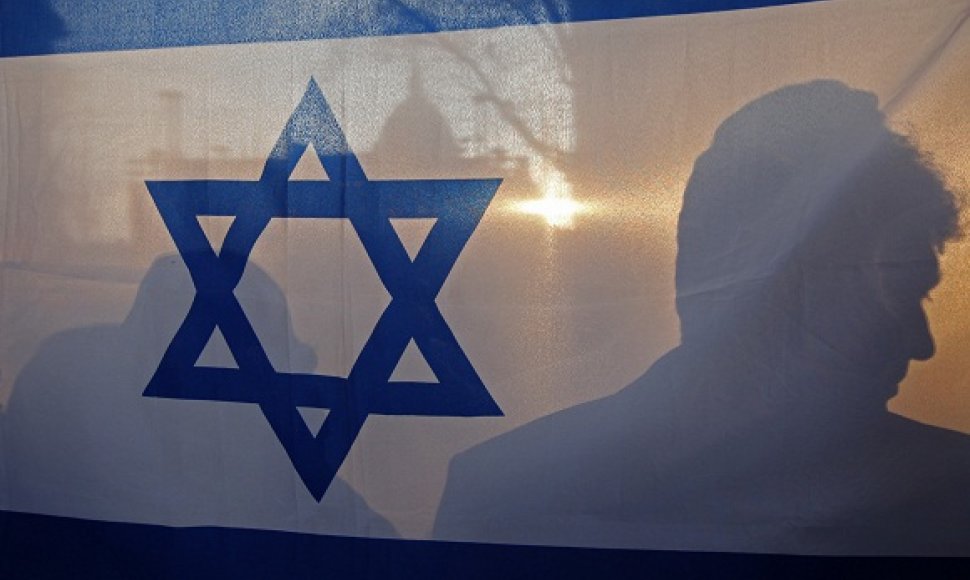Lithuania and Israel could potentially have a special relationship, given the strong Jewish presence in the country throughout its pre-World War Two history. Despite that – and the two decades that the two states have had diplomatic relations – a breakthrough has only happened in recent years.
 |
| LR ambasados Izraelyje nuotr. /Lithuania's ambassador to Israel Darius Degutis |
“We have made over 20 governmental or parliamentary visits between 2009 and 2012 alone – twice more than during the entire period since 1992, when we established diplomatic relations. There are few countries that Lithuania has so dynamic, intense, and positive ties with,” says Lithuanian ambassador to Israel Darius Degutis.
“Trade relations have been gradually growing: Lithuania's exports to Israel goes up 40-50 percent each year. Tourist flows are on the rise, too.”
8.9 thousand Lithuanians visited Israel in 2011 – 62 percent more than the year before. A reciprocal tourist flow was encouraged by direct flights between Vilnius and Tel Aviv last summer.
“We hope that the flights will be resumed this spring, as the route was very popular and tickets would sell out instantly. There are many migrants from the former Soviet Union in Israel. They can still remember our resort towns, they love Druskininkai and Palanga, go there with families and spend holidays. It is not only them – all Israelis like our resorts, nature. Summers are exhaustingly hot in Israel, so they are happy to escape into the refreshing greenery of Lithuania. Besides, they care a great deal about its Jewish history, cultural heritage that they find in Vilnius, Kaunas, and other towns,” the ambassador says, quoting articles about Lithuania that have recently appeared in major Israeli newspapers.
Respect instead of denial of past
Adding up several generations of Jewish expatriates from Lithuania, the total number of Israelis of Litvak descent amounts to some 200 thousands.
“Among them are such unique personalities of international renown like [Israeli] Prime Minister Benjamin Netanyahu, whose grandfather came from Pumpėnai near Panevėžys. The grandfather of former prime minister and minister of defence Ehud Barak was born in the village of Pušalotas, also near Panevėžys. President Shimon Peres's grandfather comes from Vyšniava village. It is now in Belarus, but was once part of Lithuania, so Peres's grandfather rightly identifies himself as a Litvak. In other words, almost all Israeli leaders are Litvaks. Not to mention luminaries of culture, art, science, business...” Degutis assures.
He says that these people could serve as mediators between Lithuania and Israel.
“That is not only important economically – they could help rebuild bridges between the two nations. Let's face it – the tragedy of the Holocaust, when 95 percent of Lithuania's Jewish population was exterminated, has resulted in a chill in bilateral relations. But over the last two decades, the two states have been looking for ways to rebuild bridges and rekindle interest in one another,” the ambassador explains.
In doing this, he adds, it is crucial to remember the tragic fate of Jews in Lithuania instead of suppressing it: “It has been noted that the Government and parliament passed the law on compensating the Jewish community for its lost property; issues over protection of the old Jewish cemetery in Šnipiškės have been settled; a Jewish library was opened in central Vilnius; restoration works on the Great Synagogue of Vilna were initiated; Tolerance centres were set up throughout Lithuania. Israel responds alertly and respectfully to such developments,” Degutis assures.
Respect for Lithuanian achievements
The ambassador believes that the life sciences forum LSB2012, which was held in Vilnius last September and was attended by a delegation of over 100 entrepreneurs and scientists from Israel, was a significant turning point in bilateral relations.
“It comes to show that Israel sees a potential in these relations and values Lithuania as a partner,” Degutis sums up.
He notes that the Israeli economy is greatly diversified, it relies heavily on new technologies, has a well-developed high-tech innovation sector, takes scientific research seriously; Israel boasts the highest number of start-up ventures per capita in the world and its economy successfully avoided the global recession – its growth remained stable.
“Israel has long realized that agriculture is not enough for a sound foundation of economy, so they pay much attention to innovation. As much as 4.5 percent of the GDP is assigned to scientific research. Tapping intellectual resources is something they are good at,” Degutis says.
He assures that Israeli scientists and entrepreneurs have great respect for Lithuania's achievements in biochemistry and biosciences, an impressive growth in high-tech sector.
“They can see that our companies employ skilled top-notch specialists. The Israelis are also attracted by Lithuania's geography. The fact that we are part of the EU appeals to them, as well as the proximity of the huge Russian market. [...] In turn, we work to encourage Lithuanian entrepreneurs to take interest in Israel's achievements in high technologies. It's an open niche, offering vast business potential. We want our scientists and businesspeople to engage in joint projects, perhaps using EU funds. There are possibilities for that,” the ambassador says.
Lithuanian and Israeli governments have concluded an agreement on cooperation in industrial research and experimental development. Based on the treaty, Lithuanian and Israeli companies are invited – for the second time already – to apply for funding of joint research projects.
Investing in sentimentality
Trade between Lithuania and Israel totalled 82.77 million litas (24 million euros) over January-June 2012 – or 41 percent more than during the same period in 2011.
Direct foreign investment from Israel stood at 59.52 million (17 million euros). One of the investors is Israel's pharmaceutical giant Teva.
Vladas Algirdas Bumelis – who is Israel's honorary consul in Lithuania and was, until April, CEO of generic drug manufacturing company Sicor Biotech, owned by Teva – believes that Israeli investment in Lithuania will only grow.
“It is easier to build economic cooperation on emotional ties. When you manage a multi-billion corporation, you might as well invest several million into Lithuania out of sheer sentimentality. There have been examples: take, for instance, the Diamond Museum in central Vilnius, which was an initiative of an Israeli Litvak,” Bumelis notes.
“Made in Lithuania”
Of the Lithuanian presence in Israel, the food industry has made particularly successful forays.
“Israeli supermarkets sell Lithuanian cheese, curd desserts, Vilnius mayonnaise, Žemaitijos Pienas butter, Panevėžys ice cream, Švyturys-Utenos Alus beers and liquors,” Ambassador Degutis says. “We are successfully exporting furniture and mannequins. After all, Manekenų Pasaulis (“World of Mannequins”) is one of the major mannequin manufacturers in the world.”
Vadimas Ivanovas, analyst at Enterprise Lithuania, says that Israeli retail chains are very interested in Lithuanian sweets, pastries, canned vegetables, various sauces, alcoholic beverages, mineral water. “Veal is particularly popular,” he says.
Ivanovas notes that biggest challenges for Lithuanian exporters are presented by competition with cheaper products made in Asia and often labyrinthine kashrut certification procedures.
It is hoped, however, that Lithuanian-Israeli trade will be helped by the recently established position of Lithuania's attaché for commerce.
First come, first served
Lithuania has recently turned to the Litvak community in South Africa, too.
“When it comes to political and economic relations, human contact is a crucial factor. South Africa is a still somewhat undiscovered country, but one presenting huge potential for us,” Degutis believes.
The Lithuanian Confederation of Industrialists agrees that South Africa's Litvak community can provide a door for Lithuanian entrepreneurs to explore the still largely unfamiliar market.
The Confederation hosted a panel discussion “Lithuania – Israel – South Africa: A Business Triangle” last year. In his opening address, Vytis Mackevičius, executive director of Lithuanian-Israeli Chamber of Commerce, said that South Africa was one of the most dynamic developing economies of the decade. The market is huge, yet largely unexplored by Lithuanian entrepreneurs.
“It is open for exports, joint business projects, we can also import and be their representatives. In this market, it's first-come, first-served,” Mackevičius says.
He notes, moreover, that once Lithuanians have a foothold in South Africa, it can provide a springboard for entering other African markets: “Stories of those who tried doing business with Sub-Saharan Africa sound more like adventure narratives than business success. South Africa, being the strongest economy in the continent, has been developing business ties with other African countries for twenty years. So looking into potential cooperation with South Africa, we should remember that it can be a gateway to many other African republics,” Mackevičius says.
Mythology of emigration
About 80 thousand Jews in South Africa track their lineage to Lithuania. Litvaks account for almost 90 percent of the entire Jewish community there – mostly Jews who left Lithuania in the period of economic migration.
Anna Avidan, who heads the organization “North Jerusalem”, notes that the history of how Litvaks came to South Africa is littered with myths, most of them untrue.
One the false myths claims that “Jews have always had money, but wanted to have even more, and learning of gold mines in South Africa, went there,” according to Avidan.
“Migration to South Africa essentially happened in the 1920s. Just like hundreds of thousands of Lithuanians went to the US in search of a better life, so did Jews. And it was more of an accident than any intention that so many of them ended up in South Africa. When the first wave of migrants from Lithuania reached London, several bigger groups of Jews bought cheaper ship tickets to South Africa, as going to the US was more expensive. When they arrived in South Africa and saw the huge potential for doing business, they started inviting families and friends to join them. And thus word-of-mouth about South Africa spread among Lithuanian Jews,” Degutis explains.
Dreams of a house on a lake
Degutis notes that South Africa's Litvaks show unique and amazing interest in Lithuania: “If anyone else in the world has the same passion for the cold beetroot soup as we do, it must be the South African Litvaks. I was amazed when a black cook made cold beetroot soup, potato cake, pickled herring Lithuanian style, fish cutlets – they tasted just like ones made by our parents and grandparents.”
The Lithuanian embassy in Israel often receives enquiries from South Africa's Jews about tourism in Lithuania. “They want to see the homeland of their grandparents, they enquire how to find one place or another,” Degutis says.
In addition to finding family roots, some seek business relations.
“South African Litvaks include many leaders of majors international companies, chairman of the South African Supreme Court, director of the diamond exchange, manager of the national bank, etc. We are glad the founder and owner of the biggest company listed on Johannesburg stock exchange, who manages a 14-billion-dollar empire employing 120 thousand people in 26 countries, has recently bought a company in Kaunas,” Degutis says.
He says he hopes that Lithuania will someday manage to set up a diplomatic representation in South Africa which could give a boost to ties with local Litvaks.
“Some South Africa's Litvaks have made impressive careers, they can live high. What does Lithuania mean to them? It is the land of their grandparents. Owning multi-billion empires, they dream of a hut on a lake in Lithuania, with two chickens, a cow. They like everything here – the climate, food,” Ambassador Degutis believes.













